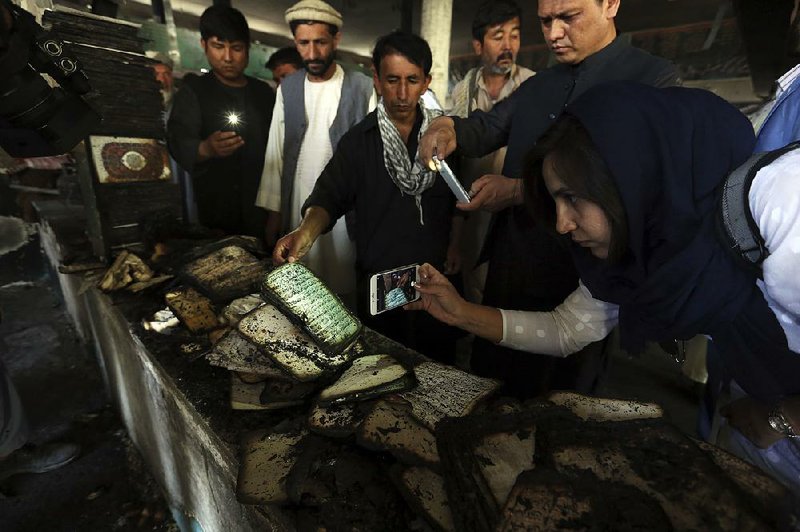KABUL, Afghanistan -- The number of people killed in an attack on a Shiite mosque in the Afghan capital during Friday prayers rose to at least 28 -- up from 20 -- including women and children, the chief of Kabul's hospitals said Saturday.
Two assailants blew themselves up and another two were shot dead by Afghan security forces, according to police. Kabul hospital chief Mohammad Salim Rasouli said more than 50 people were wounded in the attack that went on for hours.
The Interior Ministry said four of the dead were police.
Hundreds of family members, relatives and other Afghans participated in the burial of about two dozen victims inside the mosque compound Saturday.
Sayed Jan Agha, 34, lost his mother and an aunt in the attack. He said he tried several times to get into the mosque and rescue his mother and other relatives, but security forces prevented him.
"My mother was martyred while she was trying to come down from the second floor. She was shot right at the stairs," Agha said.
Agha said his aunt called him and asked for help while she was bleeding, but no one could help her while the battle was going on, and she died from her wounds, he said.
The U.N. Assistance Mission in Afghanistan in a statement condemned the attack. It said at least two attackers wearing police uniforms stormed the mosque while several hundred worshippers, including many women and children, attended Friday prayers. One assailant detonated his suicide vest outside the mosque, while another continued inside, indiscriminately killing and wounding people, the statement said.
"This latest in a series of attacks targeting members of the [Shiite] community at worship has no possible justification," said Toby Lanzer, the U.N. secretary-general's deputy special representative for Afghanistan and acting head of the U.N. assistance group. "Such attacks directed against congregations and places of worship are serious violations of international law that may amount to war crimes."
Terrified worshippers endured about four harrowing hours of gunfire and explosions before the four attackers were killed.
Gen. John Nicholson, the top U.S. general in Afghanistan, said the U.S. should be open about the ongoing fight against Afghan insurgents; the dangers of terrorism radiating from an unstable, Taliban-plagued Afghanistan; and the American interests at stake in making sure the impoverished Muslim nation does not again become a redoubt for international Islamist militias such as al-Qaida and the Islamic State.
"As a soldier, the concern I have is about terrorism emanating from this area," Nicholson said late Friday. "The requirement to keep pressure on these terror groups to prevent another attack on our homeland ... fundamentally, that is why we are here."
Americans, he added, "need to be concerned about the Islamic State emerging from this region. The Taliban enable them to exist, and if the Taliban were to return, they would flourish." A return to Taliban rule, he said, "would mean another threat to our homeland."
There is also another aspect to Nicholson's commitment: an empathy for Afghans and their struggles.
"I believe in the Afghan people," he said. Since his first assignment here in 2006, he continued, "I came to have great respect and affection for the Afghan people, who have endured an incredible amount of hardship for the last four decades, yet still in spite of all that are incredibly pious, hard-working, hospitable and truly want a better life for their children."
Information for this article was contributed by Rahim Faiez of The Associated Press and by Pamela Constable of The Washington Post.
A Section on 08/27/2017
